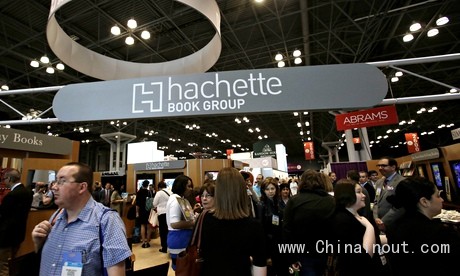
一本電子書應(yīng)該值多少錢?這些錢是怎樣分配的,?這兩個(gè)問題似乎是出版行業(yè)之間激起的爭論的焦點(diǎn),。這場結(jié)束的爭論會給讀者,作家,,出版商,,書商帶來怎樣的持續(xù)的反響呢?
這場爭論的激起是因?yàn)橛⑿爻霭婀荆ㄊ澜缟献畲蟮某霭嫔讨唬┮约皝嗰R遜(世界上最大的圖書零售商在)之間的談判引起的。據(jù)大家所說,,爭論的觸發(fā)點(diǎn)是誰控制電子書的
價(jià)格,。在這個(gè)相同的話題上這樣的沖突并不是第一次發(fā)生。在2010年,,和蘋果公司合作的五大出版商之一阿歇特提高了電子書的價(jià)格迫使蘋果這個(gè)電子零售商推行新的盈利模式,。
迄今為止,電子書的銷售就像印刷書的銷售一樣,。出版商給了大約50%的批發(fā)價(jià)的折扣,,零售商可以制定一個(gè)他們覺得合適的零售價(jià)格。他們可以打折出售書籍,,但是他們也需要承受因此而帶來的利潤上的壓力,。根據(jù)新的計(jì)劃,出版商需要將書的價(jià)格告訴零售商,,而零售商要求的折扣則降到了30%,,使得零售商再對書進(jìn)行打折這種事是不可能的了。這樣就造成消費(fèi)者需要掏更多的錢買書,,出版商要花更多的錢出書,,對零售商而言則沒有什么控制。
美國司法部門介入調(diào)查,,發(fā)現(xiàn)了勾結(jié)和價(jià)格操縱的證據(jù),,于是這種模式就被消除了。現(xiàn)在出現(xiàn)的是前兩種模式的奇怪的融合,。出版商定價(jià)和制定折扣繼續(xù),,但是給零售商的折扣仍然控制在30%以內(nèi)。
根據(jù)先前的批發(fā)的模式,,出版商把一本電子書的定價(jià)為14.99美元,,并且有給零售商的50%的折扣,那么像亞馬遜那樣的在線零售商就可以對該電子書打折,,給消費(fèi)者9.99美元這樣一個(gè)更合理的價(jià)格,。消費(fèi)者會期待電子書的價(jià)格會少于他們通常所熟悉的紙質(zhì)書的價(jià)格。但是如果根據(jù)新的折扣率,,亞馬遜還以原來的價(jià)格售出電子書的話,,那么它一定會賠錢。而出版商,,對于降低制定的給零售商的折扣這樣的事情也會缺乏熱情,。
像阿歇特這樣的公司卻足以讓人艷羨。它能制定較高的電子書價(jià)格(保護(hù)它和大型書商之間的關(guān)系),,并且依靠亞馬遜削減利潤來改變電子書的數(shù)量,。這種新的情況就制造了意想不到的事情:曾經(jīng)一直抱怨亞馬遜的折扣措施的作者開始抱怨亞馬遜的折扣給的不夠,。在這場兩大公司的談判中,來自阿歇特的一方指控亞馬遜通過提供和出版商自身制定的相似的情況來提升價(jià)格,。
展現(xiàn)在投資商面前的情況是,,阿歇特公司已經(jīng)聲明把控制電子書價(jià)格當(dāng)成是它的首要目標(biāo)。但是上一周這種習(xí)慣性的平靜被打破了,,來自亞馬遜的代表方認(rèn)定談判的導(dǎo)火索就是價(jià)格,。
所以雙方都認(rèn)為它們正處在危急當(dāng)中。歷史表明亞馬遜認(rèn)為電子書花費(fèi)不能超過9.99美元,。和亞馬遜簽訂協(xié)議的自行出版的作家支持制定的協(xié)議,,即如果電子書的價(jià)格超過了9.99美元的話,那么給作者支付的提成率將會減半,,而阿歇特則更樂意讓電子書的價(jià)格達(dá)到14.99美元甚至更高,,那么亞馬遜可以定任何折扣,同時(shí)消費(fèi)者的負(fù)擔(dān)也就重了,。
在這樣的許多的爭論之中,,媒體的造勢也通常是片面的。像Stephen Colbert或者是James Patterson這樣的阿歇特專職作家都要求亞馬遜和阿歇特真誠的談判,,盡管并不能說清哪一方要求過高,,或者誰是公正的或不公正的。上周,,當(dāng)讀者和不知名的作家給予了有站在哪一方的能力時(shí),,結(jié)果是他們壓倒性的站在亞馬遜的一邊, 到目前為止要求改變的請?jiān)笗灻呀?jīng)達(dá)到了5000個(gè)左右,。在這種僵持情況下最理想的結(jié)局會是怎樣的呢,?作為其中的一個(gè)結(jié)果那就是改革,。我們中的許多人都希望看到阿歇特專職作者所承受的痛楚將會立刻結(jié)束,。
最簡單和最公平的做法就是讓阿歇特停止堅(jiān)持電子書定價(jià)超過9.9美元的想法。高的電子書定價(jià)傷害的不僅僅是每位讀者,,而且損失到一定的讀者人數(shù),。而阿歇特的作者的書的銷量下降也正是由于缺乏競爭力的定價(jià)所造成的。有了合理的價(jià)格,,阿歇特就能增加部門,,而亞馬遜就能賺取利潤,而這些利潤并不會讓消費(fèi)者承受重大的經(jīng)濟(jì)負(fù)擔(dān),,與此同時(shí),,亞馬遜也不用不得不打折扣來賺取利潤了。
How much should an ebook cost? And how should that money be split? These two questions seem to be at the centre of a debate ripping through the publishing industry. How this debate plays out could have lasting repercussions for readers, writers, publishers, and booksellers. The debate arose as negotiations between Hachette Book Group – one of the largest publishers in the world – and Amazon, the largest book retailer in the world, began to falter. By all accounts, the sticking point is over who controls the price of digital books. It isn't the first time this clash has occurred over the very same issue. In 2010, Hachette was one of the five publishers that worked with Apple to raise the price of ebooks and force digital retailers onto a new profit model.
Hitherto, ebooks were sold much like print books. Publishers gave a wholesale discount of around 50%, and retailers could set the list price however they saw fit. They could discount the book, but they would take the hit on profits alone. Under the new plan, publishers would dictate the price to the retailer and the retailer's cut would be reduced to 30%, making discounting impossible. This resulted in higher prices for consumers, more money for publishers, and no control for retailers.
The United States Department of Justice stepped in, found evidence of collusion and price-fixing, and this model was dismantled. What emerged in its place has been a strange amalgamation of the two former models. Wholesale pricing and discounting resumed, but the discount provided to retailers remained in the neighborhood of 30%.
Under the previous wholesale model, publishers might price an ebook at $14.99 (£8.99), and with the 50% discount, an online retailer like Amazon was able to discount to a more reasonable $9.99 to serve customers. Customers who expect digital books to cost less than the paperbacks with which they were familiar. With the new discount rate, Amazon stood to lose money by offering that same price. Publishers, meanwhile, were less than enthusiastic about lowering the offered wholesale discount.
Publishers like Hachette now found themselves in enviable territory. They could price ebooks high – protecting their relationship with high-street booksellers – and rely on Amazon to cut their own margin to the bone in order to move quantities of ebooks. This new situation created the bizarre scenario wher authors who once complained about Amazon's discounting are now complaining that they aren't discounting enough. And during these negotiations, parties from Hachette's side are accusing Amazon of raising prices by offering something close to what the publisher itself is setting.
In a presentation to investors, Hachette has stated as a primary goal the control of ebook pricing. Breaking their habitual silence just last week, a representative from Amazon confirmed that the sticking point in these negotiations is indeed price. So both sides have confirmed what's at stake. History would indicate that Amazon thinks ebooks should cost no more than $9.99. Their agreement with self-published authors supports this, as the royalty rate paid halves if the price exceeds this amount. Hachette, meanwhile, would very much prefer to offer ebooks at $14.99 or more and leave any discounting up to Amazon (or any pain up to their customers).
Amid these negotiations, a media campaign has erupted that has been almost entirely one-sided. Hachette authors from Stephen Colbert to James Patterson have demanded Amazon to negotiate in good faith, despite being unable to articulate what each side is demanding and who is being fair or unfair. When readers and lesser–known writers were given the ability to take sides late last week, they overwhelmingly came out on the side of Amazon, with a Change.org petition approaching 5,000 signatures as of this writing.
What is the ideal outcome in this standoff? Resolution, for one. Many of us would love to see the pain being suffered by Hachette's authors end immediately. The simplest and fairest way for this to happen would be for Hachette to stop insisting on ebook prices well north of $9.99. High ebook prices harm not only individual readers but readership in general. And Hachette's authors suffer from lost sales due to uncompetitive prices. With reasonable prices, Hachette could continue to move units, and Amazon would be able to earn the margin a retailer is owed by not having to discount for its customers at great sacrifice to itself.










